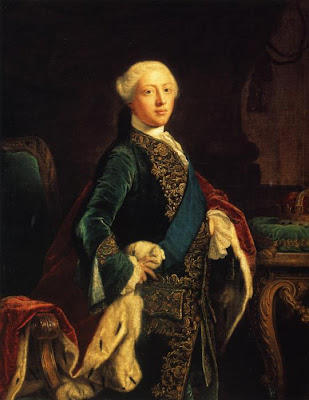
Few painters have ever dominated the taste and style of their time so completely as Sir Joshua Reynolds, one of the great triumvirate of grand-style portraitists of 18th century England along with his rivals Thomas Gainsborough and Thomas Lawrence. Reynolds served as the first President of the Royal Academy of Art. From that seat, he dictated the standards of art in his Seven Discourses on Art and created guidelines for art education that influenced several generations after him.

Reynolds painted anyone and everyone of note in 18th century England. He developed a reputation as an intellectual as well as an artist (not always the same thing), buddying up with luminaries such as the author Dr. Samuel Johnson, philosopher and politician Edmund Burke, and Shakespearean actor David Garrick. Reynolds portrait of Johnson (above) displays his affinity for his subject, seemingly catching the good Doctor in mid thought, his pen just about to preserve it for posterity, Boswell no doubt just off stage preserving the preservation in his famed Life of Johnson.

Of all Reynolds’ celebrity portraits, my favorite remains that of author Lawrence Sterne. Anyone who has read The Life and Opinions of Tristram Shandy, Gentleman (a rollicking good read, I assure you) will recognize the devilish glint in Sterne’s eye. Sterne’s grin always brings to my mind the phrase “sidelong pickerel smile” from Theodore Roethke’s poem “Elegy for Jane (My student, thrown by a horse).” Amidst all the trappings of power and hobnobbing with celebrity, Reynolds never lost his ability to capture that spark of individuality in his subjects.

Of course, Reynolds’ coziness with royal power (as shown in his portrait above of George III, pre-American Revolution and pre-Madness) didn’t endear him to everyone. William Blake, Reynolds’ slightly younger contemporary, condemned Reynolds in the margins of his copy of Seven Discourses on Art, saying that “This Man was Hired to Depress Art.” Blake, perhaps jealously but justifiably, railed on further:
This is the opinion of Will Blake: my Proofs of this Opinion are given in the following Notes...
Having spent the vigor of my Youth and Genius under the Oppression of Sr Joshua & his Gang of Cunning Hired Knaves Without Employment & as much as could possibly be Without Bread, The Reader must Expect to Read in all my Remarks on these Books Nothing but Indignation& Resentment. While Sir Joshua was rolling in Riches, [James] Barry was Poor & Unemploy'd except by his own Energy; [John Hamilton] Mortimer was call'd a Madman, & only Portrait Painting applauded & rewarded by the Rich & Great. Reynolds & Gainsborough Blotted & Blurred one against the other & Divided all the English World between them. [Henry] Fuseli, Indignant, almost hid himself. I am hid.
Blake’s marginalian harangue reminds us of the unfortunate equation of power in the art world: the high status and acclaim of some often comes at the cost of the unjust marginalization and erasure of many others.




No comments:
Post a Comment